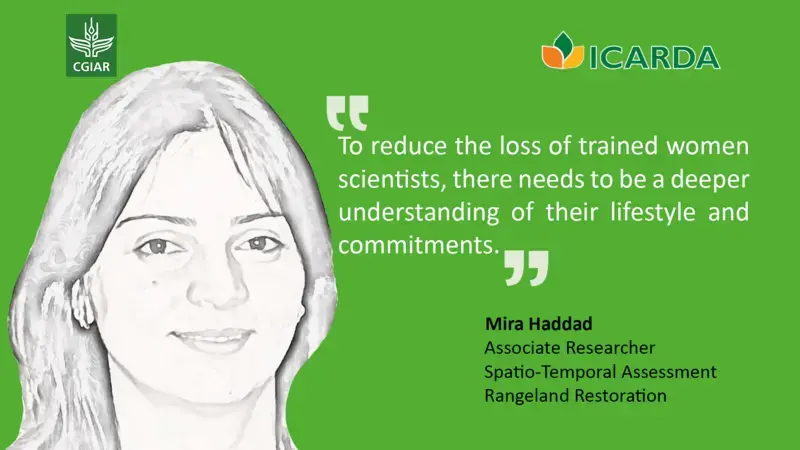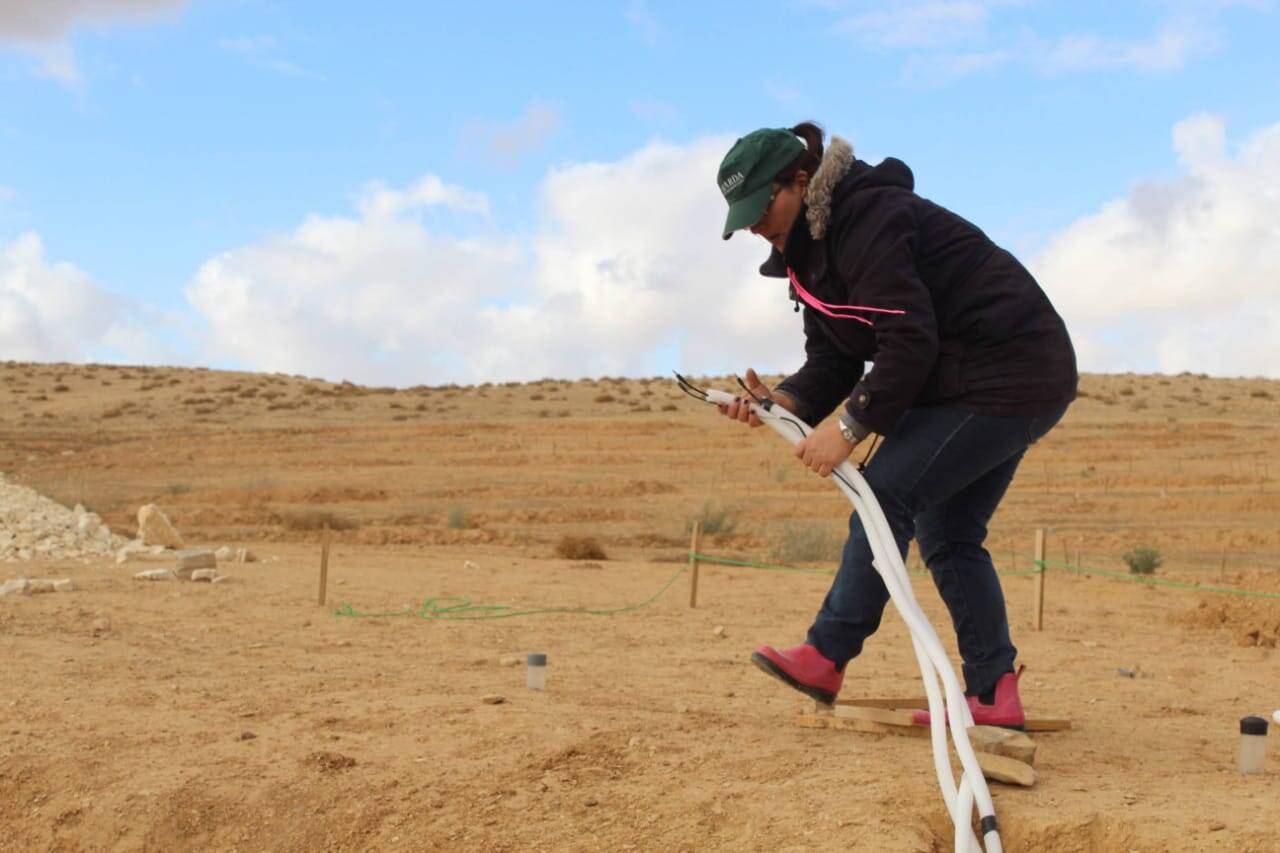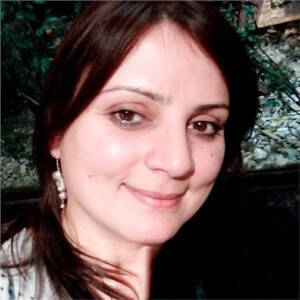Q&A with Mira Haddad

- Women in the field of science for development, including in agricultural research, are underrepresented compared to their male peers. How do you explain this, and what could be done to reestablish balance?
Mira Haddad: I think this is true, especially in Arab countries and across developing countries in general. Men have more opportunities compared to women, who have many other duties to carry out. But let me give you an example: say an important meeting with high level panelists is organized. In most cases in this region, I see that men are overwhelmingly asked to represent the institution, not their female counterparts.
This not necessarily what happens at ICARDA, but I see it as common practice in the Middle East. In addition, because agricultural research involves going to the field, it can clash with the cultural and religious responsibilities women are bound with.
As a female researcher, will the male community members talk to you as an equal, or will they feel antagonized by your presence, or judge you for coming out of what they see as your ‘feminine role’ to work in ‘their’ sphere? So, it is difficult. But with hard work, we can overcome those boundaries.
- How has ICARDA supported your career?
MH: Thanks to ICARDA and support from my team and managers, I have been fully engaged in doing fieldwork, interacting with the farming communities, and implementing research activities on site from early on, which has provided a fantastic opportunity for me to grow as a scientist.
ICARDA has also backed my education. I got my master’s degree through ICARDA’s support, and I am currently doing my PhD in physical geosciences also through ICARDA. I am doing my PhD at Utrecht University in Holland, and soon I will have an international certificate which will open more doors to me.
- Do you believe that science, as a field and a profession, is becoming increasingly gender-neutral?
MH: In many countries, it really is not the case. There is still the assumption that men should be the ones leading fieldwork, specifically in agricultural research. On all the other levels, such as IT, in the labs and at the institutional level, we see more gender neutrality than in the field. I think that one of the reasons for this is that men feel more comfortable speaking to other men.
But when it comes to women groups from rural communities, I believe that only a female researcher can capture their true voice. When I go to the field in Jordan, I am still faced with some puzzled men who wonder what I am doing there, and why would I be sitting among 20 men discussing science.
- Globally, there does not seem to be major problem training women scientists, but rather the issue is to recruit them and retain them in scientific professions. Why is that, according to you, and how can we stem this loss of trained female scientists?
MH: I think institutions often unconsciously prefer to hire men because they know that they, for the most part, carry less responsibilities on their shoulders than most women. Women carry out their day-job, yet often are still expected to be back home at specific times and fulfill a variety of home and family-related duties. Is this the same for men? I don’t think so.
Meanwhile, many talented female scientists I know must, in addition to caring for their husband and children, also support an aging parent. If a woman is not married, she still needs to support her family in other ways, sometimes in a financial way, other times with care and housework.
So, to reduce the loss of trained women scientists, there needs to be a deeper understanding of their lifestyle and commitments. Flexible working hours and a flexible work environment need to be put in place, which thankfully we have at ICARDA.

- Has the pandemic, and working from home, affected your productivity and ability to submit abstracts, or publish papers? What were the new constraints you had to work around?
MH: The pandemic required much more work effort than I had anticipated. You would think that working for home would be more relaxing than commuting to the office, but it is not. It seems to have fallen on the woman to carry out home schooling, regardless of her career.
I need to find time here and there in the middle of my kids’ online lessons, to do research, to keep an eye on my ongoing projects in the field, to analyze the readings from the field, to monitor the data collection from afar through messages, phone calls, videos because I have not had access to our instruments in the field. It was really tough.
But working with the community, albeit remotely, was my number one priority, and the data we managed to collect should be published later in the year.
- Many aspiring female scientists and girls struggle with low confidence levels, and many do not feel that their aspiration of becoming a scientist is legitimate. How could we reverse this situation?
I think they need to be given the opportunity to be heard, to be seen, and for their contributions to be acknowledged. Because of what I already explained it is much harder for women to work, so managers need make an extra effort to understand and to see the efforts made by women scientists and give them the chance to shine.
Rewarding those contributions, financially or through symbolic recognition, would be very helpful for their confidence and moral. I also think that training women to be more assertive, and to speak in public about their work would be an excellent way to build confidence.
- What advice would you give a younger version of you, starting her career in science?
I would say trust yourself. Serve the science that you were born to serve, challenge yourself often, and most importantly, try not to care about what others think of your career choice. Safeguard your vision at all cost.
- What personal achievements are you the most proud of?
I am very proud to be getting my PhD, of course. But I am also thrilled to observe the positive impacts the Jordan project I am involved in is having on local communities.
Our work is to rehabilitate rangelands ecosystems by constructing micro water harvesting systems, such as land application, and by planting plant species that we believe flourished in the area a long time ago. The vegetation is used by local community for animal grazing. We mainly do biophysical work which entails implementing the site, and monitoring the water cycle of rainfall, filtration, runoffs, and soil erosion.
More recently, we started analyzing the improvements in soil fertility, and how the restored site is doing in terms of carbon storage and sequestration.
---

Mira Haddad is a senior research assistant: spatial analysis and database management working in the Water, Land and Ecosystem program (WLE) at ICARDA since 2013. She holds a MSc. in Environmental Science and Management. She is specialized in spatial analysis and database management. Mira work with WLE scientists in implementing projects related to soil and water management in several countries in the region.
She is responsible for project databases (including field data) collection, analysis, curation, and development. She functions hydrological models for watershed management and predicting climate change impacts, defining suitable and similar areas to adopt improved agriculture technologies.
